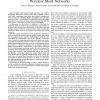Free Online Productivity Tools
i2Speak
i2Symbol
i2OCR
iTex2Img
iWeb2Print
iWeb2Shot
i2Type
iPdf2Split
iPdf2Merge
i2Bopomofo
i2Arabic
i2Style
i2Image
i2PDF
iLatex2Rtf
Sci2ools
INFOCOM
2010
IEEE
2010
IEEE
Elastic Rate Limiting for Spatially Biased Wireless Mesh Networks
—IEEE 802.11-based mesh networks can yield a throughput distribution among nodes that is spatially biased, with traffic originating from nodes that directly communicate with the gateway obtaining higher throughput than all other upstream traffic. In particular, if single-hop nodes fully utilize the gateway’s resources, all other nodes communicating with the same gateway will attain very little (if any) throughput. In this paper, we show that it is sufficient to rate limit the single-hop nodes in order to give transmission opportunities to all other nodes. Based on this observation, we develop a new rate limiting scheme for 802.11 mesh networks, which counters the spatial bias effect and does not require, in principle, any control overhead. Our rate control mechanism is based on three key techniques. First, we exploit the system’s inherent priority nature and control the throughput of the spatially disadvantaged nodes by only controlling the transmission rate of the spatially a...
| Added | 28 Jan 2011 |
| Updated | 28 Jan 2011 |
| Type | Journal |
| Year | 2010 |
| Where | INFOCOM |
| Authors | Vincenzo Mancuso, Omer Gurewitz, Ahmed Khattab, Edward W. Knightly |
Comments (0)

